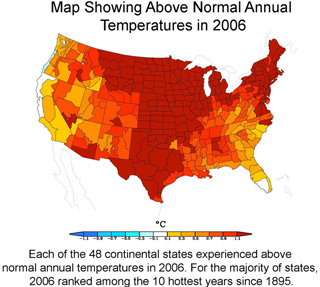Climate change will cause significant disruptions to U.S. agriculture says Fed study
Climate change will cause significant disruptions to U.S. agriculture says Fed study
mongabay.com
May 28, 2008
Human-induced climate change will cause significant disruptions to water supplies, agriculture, and forestry in the United States in coming decades, says a federal report released Tuesday.
The report, titled “The Effects of Climate Change on Agriculture, Land Resources, Water Resources and Biodiversity in the United States” and posted online at climatescience.gov, shows that shifts in climate patterns will produce a mix of economic and ecological benefits and detriments across the United States.

Map showing above normal annual temperatures in 2006. Courtesy of NOAA.
|
Western states are expected to see the largest decrease in water flows from both reduced rainfall and declining snow pack, while the Midwest and East are expected to see more precipitation. Some crops — including grains and oilseeds — will mature more rapidly but higher temperatures and reduced water availability will leave them more vulnerable to failures. Warmer conditions will negatively affect livestock, while forests in the interior West, the Southwest, and Alaska will continue to experience increases in the size and frequency of forest fires, insect outbreaks and tree mortality. Weeds and pests — especially invasive species — are expected to expand their range in response to climate change.
The report states that elevated atmospheric CO2 levels will allow young forests on fertile soils will achieve higher productivity. Northern zones will experience longer growing seasons and regions with increased water availability may see agricultural benefits.














